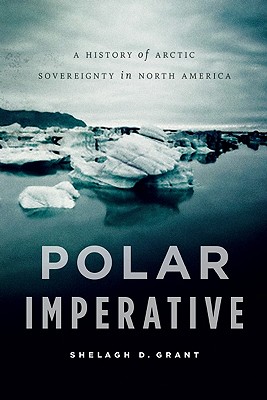Once widely considered a vast, unremarkable frozen landscape, realities of climate change are changing the north’s façade. Previously obscure concepts like Arctic sovereignty and categories of off-shore waters are now glaringly pertinent as the polar ice continues to melt.
In Polar Imperative, clarifying the history of the Arctic is precisely what Shelagh D. Grant sets out to do. Drawing on extensive archival research and personal experience, Grant covers the entire spectrum of Arctic history, starting with the area’s first inhabitants and moving through 19th century colonial land deals, the development of sovereign titles, World War II and the Cold War, as well as the discovery of Arctic oil and the recognition of Aboriginal rights.
In an interview with rabble.ca, Grant explains that each facet of Arctic history leads to the current era of conflicts and challenges in the north. This has created a significant role for the media to play.
“Our government has just been classic for saying that our Arctic sovereignty is secure, but they’re not admitting that they may be working on some aspects that are not secure. So the bottom line is that if the Canadian public is going to support any government, no matter what party, and the amount of investment that will have to be made in the Arctic to be able to enforce our own regulations, the people in the south have to know what’s at stake. So yes, the media have a big role.”
Although oil was first discovered in the Arctic in the early1900s, oil exploitation was hindered due to lack of viable transportation options. The melting of polar ice has increased oil possibilities but in light of this past summer’s BP oil catastrophe, Grant would like to see more oil clean-up facilities and technology made available prior to the approval of more drilling.
“The Canadian Senate has approved oil drilling in the Beaufort Sea. I just read about the technology involved in cleaning up an oil spill in the Arctic compared to the Gulf of Mexico. The congressional report on the Arctic to congress this past October maintained that their coast guard said that they did not have the technology or the ability to clean up a major oil spill in the Arctic.” To Grant, this is a clear indication that oil drilling approval needs to slow down.
The issue of oil safety is also particularly relevant in terms of pollution in the Arctic because there are no internationally agreed upon pollution standards. There are national standards, and as Grant points out, the International Maritime Organization has set out voluntary standards, but there is no guarantee that all nations will comply with them.
Putting a seldom heard slant on climate change, Grant introduces the possibility of Greenland benefiting from climate change.
“It has been known for years that the Greenlanders would love to be independent and a lot of us wonder how they would do that without military support from somewhere. But the melting glaciers and the ability to mine or off-shore drill over a longer season makes the whole project more feasible. They have already found oil off-shore of Greenland which they have leased to Cairn Energy.”
Grant further explains Greenland’s resource situation in comparison to Canada. “The Greenland government receives a portion of all royalties and licensing which is something Nunavut doesn’t get in Canada. So what they have to do, basically, is make enough money out of resource development to not be dependent on the annual grant that is provided by Denmark. Some say they can do it in 20 years and some say it might not be quite as easy as that. A lot can happen in 20 years.”
The history delineated in Polar Imperative does indeed demonstrate that the Arctic’s future is at a critical juncture and that a lot of changes can happen over a few short years. Media, oil, pollution and climate change are all factors that have the attention of both the north and south. This book challenges images of a pristine, snow-covered landscape and exposes the Arctic’s long dormant issues.—Noreen Ritsema




